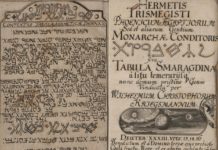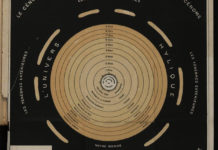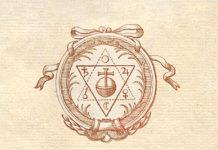Paris in the 1890s. The city is in the midst of the French Occult Revival. Sâr Mérodack, also known as Joseph-Aimé (Joséphin) Péladan (1858 -1918) holds a series of six artistic salons known as the Salon de la Rose + Croix. Emblematic of his fight against the banalities of naturalism and Impressionism, the salons embody Péladan’s notion that art can assume the mantle of religion. ‘The artist is a priest, a king, a magus’, he proclaimed: ‘I believe in the Ideal, in Tradition, in Hierarchy.’ What follows is a translation of Péladan’s grand declaration of ‘Artist as Magus’ featured in the pages of the 1892 salon catalogue. Whilst Péladan’s embrace of the symbolic and the decadent is rooted in a Romanticism that exalted emotion, nature, and the sublime, he declares, ‘[e]verything is rotten, everything is finished, decadence cracks and makes the Latin edifice tremble‘. A call to arms then, the text is a manifesto of sorts; the rallying cry, perhaps, of an aristocratic twilight struggling to come to terms with the vulgarities of progress and the audacity of the Parisian nouveau riche. The ‘Modern wretches […] will never conquer’, Péladan states. Degeneration shall be ‘withered by a flower’, and the Ideal shall shine forth resplendent.
Aesthetic Gesture (1892)
ARTIST, you are a priest: Art is the great mystery, and when your effort yields a masterpiece, a ray of divine light descends as if on an altar. O’ true presence of the resplendent divinity under these supreme names: Vinci, Raphael; Michelangelo, Beethoven and Wagner.
Artist, you are king: Art is the true empire: When your hand draws a perfect line, the cherubim themselves descend to enjoy it as if in a mirror. Spiritual designs, line of the soul, form of understanding, you give body to our dreams, Samothrace and Saint John, Sistine and Cenacolo, Saint Ouen, Parsifal, Neuviéme, Symphony, Notre-Dame.
Artist, you are a magus: Art is the great Miracle and proves our immortality. Who still doubts? Giotto touched the stigmata, the Virgin appeared to Fra Angelico: and Rembrandt proved the resurrection of Lazarus.
Answer absolute to pedantic quibbles, one doubts Moses, but here is Michelangelo; one ignores Jesus, but here is Leonardo; one leaves everything, but immutable and sacred Art continues its prayer.
Sublimity unutterable and serene, holy Grail ever radiant, ostensory and relic, unconquerable banner, almighty Art, Art God, I adore you on my knees, the last reflection of On High over our putrescence.
The dazed and sordid kings, having become citizens, end up dying on the pavement of the bone cities where their race once reigned.
The nobles wear their September bonnet blazon, courting either the people or, stupidly, indulging in stable things.
The priests have agreed to don the murderous livery; where are the unsworn?
Everything is rotten, everything is finished, decadence cracks and makes the Latin edifice tremble: and the lonely cross no longer has with it even the sword of the Guise, the gun of a chouan. Weep, Gregory VII, O’ gigantic Pope, you who had saved everything, weep from heaven over your darkened Church, and you, old Dante, rise from your throne of glory, Catholic Homer, and merge your anger with the despair of Buonarotti.
A glimmer of the holy light, a pale colour, has appeared, darkening… behold, the gallows of the holy torment is withered by a flower.
A miracle, a miracle, a rose rises and opens up and grows, striving to enclose in its pious petals the divine cross of salvation: and the consoling cross shines resplendent, Jesus did not curse this world, Jesus receives the adoration of Art.
The first Magi came to the divine Master, the last Magi will remain his children.
The august enthusiasm of the artist survives the extinct piety of the past.
Modern wretches, your race to nothingness is fatal; fall under the weight of your indignity: thy blasphemies shall not erase the works of faith O’ barren one!
You can close the church for a few days, but the museum? The Louvre will officiate, if Notre Dame is desecrated.
Yes, Strauss denied it, but Parsifal affirms it; and the Frankish archangel with his sublime voice covered the unholy gossip of Renan.
Humanity, O’ citizens, will always go to Mass, when the priest is Bach, Beethoven, Palestrina: one cannot atheise the sublime organ.
Modern wretches, you will never conquer: for Saint George, O’ monster, the eternal avenger, is the genius, and the beautiful will always be God. Brothers of all arts, here I sound the warrior call; let us form a holy militia for the salvation of ideality. We are few against all, but the angels are ours.
We have no leaders, but the old masters from the heights of paradise will guide us to Montsalvat.
Our mission began the day blasphemy became king; let a chivalry appear to honour and serve the Ideal: imperfect and sinners, let us at least be valiant; let the rose of shapes and colours become the magnificent tabernacle, and the redemptive cross will take pleasure in it.
O’ you who hesitate, my brother, do not be mistaken and confuse the fire of Faith with the cry of the fanatic.
This dear Church, the only august thing in this world, bans the Rose and believes its perfume dangerous.
Near her, we are erecting the Temple of Beauty; we will work on the echoes of the prayers, emulating, no rival, different, not divergent; for the artist is a priest, a king, a magus; for art is a mystery, the only true empire, the great miracle! A glimmer of the holy light, a pale colour, has appeared, darkening… behold, the gallows of the holy torment is withered by a flower.
A miracle, a miracle, a rose rises and opens up and grows, striving to enclose in its pious petals the divine cross of salvation: and the consoling cross shines forth resplendent…
Jesus did not curse this world.
Jesus receives the adoration of Art.
The august enthusiasm of the artist survives the extinction of yesteryear.
Sâr Péladan










